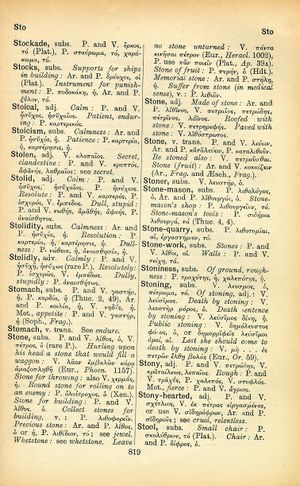stone: Difference between revisions
Μιμοῦ τὰ σεμνά, μὴ κακῶν μιμοῦ τρόπους → Graves imitatormores, ne imitator malos → Das Edle nimm zum Vorbild, nicht der Schlechten Art
m (Text replacement - "<b class="b2">Frag.</b>" to "''Frag.''") |
m (Woodhouse1 replacement) |
||
| Line 1: | Line 1: | ||
{{Woodhouse1 | {{Woodhouse1 | ||
|Text=[[File:woodhouse_819.jpg|thumb|link={{filepath:woodhouse_819.jpg}}]] | |Text=[[File:woodhouse_819.jpg|thumb|link={{filepath:woodhouse_819.jpg}}]] | ||
===substantive=== | |||
P. and V. [[λίθος]], ὁ, V. [[πέτρος]], ὁ (rare P.). | [[prose|P.]] and [[verse|V.]] [[λίθος]], ὁ, [[verse|V.]] [[πέτρος]], ὁ (rare [[prose|P.]]). | ||
[[hurling upon his head a stone that would fill a waggon]]: [[verse|V.]] [[λᾶαν ἐμβαλὼν κάρᾳ ἁμαξοπληθῆ]] ([[Euripides|Eur.]], ''[[Phoenissae]]'' 1157). | |||
[[stone for throwing]]: also [[verse|V.]] [[χερμάς]], ἡ; | |||
[[round stone for rolling on to an enemy]]: [[prose|P.]] [[ὀλοίτροχος]], ὁ ([[Xenophon|Xen.]]). | |||
[[stone for building]]: [[prose|P.]] and [[verse|V.]] [[λίθος]], ὁ. | |||
[[collect stones for building]], v.: [[prose|P.]] [[λιθοφορεῖν]]. | |||
[[precious stone]]: [[Aristophanes|Ar.]] and [[prose|P.]] [[λίθος]], ὁ or ἡ, [[prose|P.]] [[λιθίδιον]], τό; see [[jewel]]. | |||
[[whetstone]]: see [[whetstone]]. | |||
[[leave no stone unturned]]: [[verse|V.]] [[πάντα κινῆσαι πέτρον]] ([[Euripides|Eur.]], ''[[Heraclidae]]'' 1002), [[prose|P.]] use [[πᾶν ποιεῖν]] ([[Plato]], [[ap]]. 39A). | |||
[[stone of fruit]]: [[prose|P.]] [[πυρήν]], ὁ (Herodotus). | |||
[[memorial stone]]: [[Aristophanes|Ar.]] and [[prose|P.]] [[στήλη]], ἡ. | |||
[[suffer from stone]] ([[in medical sense]]), v.: [[prose|P.]] [[λιθιᾶν]]. | |||
===adjective=== | |||
[[made of stone]]: [[Aristophanes|Ar.]] and [[prose|P.]] [[λίθινος]], [[verse|V.]] [[πετραῖος]], [[πετρώδης]], [[πέτρινος]], [[λάινος]]. | |||
[[roofed with stone]]: [[verse|V.]] [[πετρηρεφής]]. | |||
[[paved with stone]]: [[verse|V.]] [[λιθόστρωτος]]. | |||
===verb transitive=== | |||
P. and V. λεύειν, Ar. and P. καταλεύειν, P. καταλιθοῦν. | [[prose|P.]] and [[verse|V.]] [[λεύειν]], [[Aristophanes|Ar.]] and [[prose|P.]] [[καταλεύειν]], [[prose|P.]] [[καταλιθοῦν]]. | ||
[[be stoned]] also: [[verse|V.]] [[πετροῦσθαι]]. | |||
[[stone]] ([[fruit]]): [[Aristophanes|Ar.]] and [[verse|V.]] [[κοκκίζειν]] ([[Aristophanes|Ar.]], ''[[Fragment]]'' and [[Aeschylus|Aesch.]], ''Fragment''). | |||
}} | }} | ||
Revision as of 08:49, 20 May 2020
English > Greek (Woodhouse)
substantive
P. and V. λίθος, ὁ, V. πέτρος, ὁ (rare P.).
hurling upon his head a stone that would fill a waggon: V. λᾶαν ἐμβαλὼν κάρᾳ ἁμαξοπληθῆ (Eur., Phoenissae 1157).
stone for throwing: also V. χερμάς, ἡ;
round stone for rolling on to an enemy: P. ὀλοίτροχος, ὁ (Xen.).
stone for building: P. and V. λίθος, ὁ.
collect stones for building, v.: P. λιθοφορεῖν.
precious stone: Ar. and P. λίθος, ὁ or ἡ, P. λιθίδιον, τό; see jewel.
leave no stone unturned: V. πάντα κινῆσαι πέτρον (Eur., Heraclidae 1002), P. use πᾶν ποιεῖν (Plato, ap. 39A).
stone of fruit: P. πυρήν, ὁ (Herodotus).
memorial stone: Ar. and P. στήλη, ἡ.
suffer from stone (in medical sense), v.: P. λιθιᾶν.
adjective
made of stone: Ar. and P. λίθινος, V. πετραῖος, πετρώδης, πέτρινος, λάινος.
roofed with stone: V. πετρηρεφής.
paved with stone: V. λιθόστρωτος.
verb transitive
P. and V. λεύειν, Ar. and P. καταλεύειν, P. καταλιθοῦν.
be stoned also: V. πετροῦσθαι.
stone (fruit): Ar. and V. κοκκίζειν (Ar., Fragment and Aesch., Fragment).

